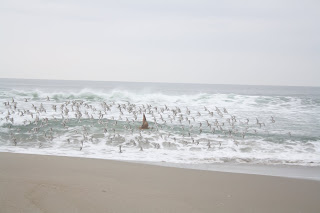 Salinas to Monterey is the vegetable basket of the United States. In the fields workers harvested artichokes. They even had orange and white portable outhouses nearby.
Salinas to Monterey is the vegetable basket of the United States. In the fields workers harvested artichokes. They even had orange and white portable outhouses nearby. "I guess it makes sense," I said, "but it's sad they aren't even given bathroom time to leave the work site."
"I guess it makes sense," I said, "but it's sad they aren't even given bathroom time to leave the work site."
"It's jobs that most Americans won't do," answered Andy. "It's drudge work. There are lots of jobs, but people don't want that kind of labor."
Farther north at Moss Landing, workers planted in the field.
Farther north at Moss Landing, workers planted in the field.
 At Moss Landing State Beach, signs warned about the nesting of snowy plover from April through mid-August. "If you walk slowly toward those brown areas in the sand," explained an older man with field glasses, "the birds will suddenly pop up from depressions in the sand." He pointed. "See where my buddy is surfing? Walk that way and have your camera ready." Of four or five surfers, the youngest looked 45 years old.
At Moss Landing State Beach, signs warned about the nesting of snowy plover from April through mid-August. "If you walk slowly toward those brown areas in the sand," explained an older man with field glasses, "the birds will suddenly pop up from depressions in the sand." He pointed. "See where my buddy is surfing? Walk that way and have your camera ready." Of four or five surfers, the youngest looked 45 years old. We walked along the marsh of Salinas River State Beach between river and ocean. We could hear waves breaking on the other side of the sand dunes. "The fishing industry moved up here," said Andy, "when everything closed in Monterey."
We walked along the marsh of Salinas River State Beach between river and ocean. We could hear waves breaking on the other side of the sand dunes. "The fishing industry moved up here," said Andy, "when everything closed in Monterey."
At Moss Landing Harbor we climbed on the rock groin. "Beware dangerous waves," warned the sign. A fog horn sounded twice every 20 seconds. Today was calm. Within minutes we saw an otter on his back eating lunch, several harbor seals turning circles, a sea lion looking for snacks and at least 15 pelicans gliding in twos and threes a couple inches above the water.
 Closer to Salinas, fields spread like black and green checkerboards. "Look at that soil," said Andy, pointing to areas already rototilled. The rich blackness contrasted to adjoining plots of green artichokes, ready for picking.
Closer to Salinas, fields spread like black and green checkerboards. "Look at that soil," said Andy, pointing to areas already rototilled. The rich blackness contrasted to adjoining plots of green artichokes, ready for picking.
 Closer to Salinas, fields spread like black and green checkerboards. "Look at that soil," said Andy, pointing to areas already rototilled. The rich blackness contrasted to adjoining plots of green artichokes, ready for picking.
Closer to Salinas, fields spread like black and green checkerboards. "Look at that soil," said Andy, pointing to areas already rototilled. The rich blackness contrasted to adjoining plots of green artichokes, ready for picking.
At the Steinbeck House, birthplace of the author and his home until he finished college, lunch included a tour of the downstairs. Our table was in the parlor. Served by Beverly, we dined on taco salad, avocado chicken wraps and spinach almond pear salad. Waitresses and hostesses, all Valley Guild volunteers in their 80's, faithfully attended guests as classical violin played softly in the background. Then Ann showed us where the author had grown up. "This is the parent's bedroom where John was born and that bureau was his," she said, pointing to a dresser behind the wooden screen, which had actually been a parlor folding door. Impeccably refinished, each room downstairs included small tables with floral clothes and white and cranberry linens, ornately painted ceilings, polished woodwork... elegance and class, unlike the Steinbeck of the novels. Andy's beer at lunch was more Steinbeck-style. "He told it like he saw it," said Ann as she walked us through the serving area to the children's bedroom, "and people here didn't like him very much for that."
I asked Ann who lived in the house when Steinbeck traveled with Charley, his standard French poodle, in the early 1960's and if he came back to see the place of his birth.
I asked Ann who lived in the house when Steinbeck traveled with Charley, his standard French poodle, in the early 1960's and if he came back to see the place of his birth.
Ann said, "The Catholic Church probably had the house at that point, but when Steinbeck came here with Charley, he didn't want to be noticed. He didn't let anyone know he was here."
"Inconspicuous," I added. "He was just an observer to see if what he had written was accurate and to take a measure of America." In fact, in Travels with Charley, he wrote, "I came out on this trip to try to learn something of America. Am I learning anything? If I am, I don't know what it is."
Now, everything here is in Spanish: restaurants, grocery stores, even the directions at the laundromat and the graffiti on the garbage bin. I wonder what John Steinbeck would think of that.
Now, everything here is in Spanish: restaurants, grocery stores, even the directions at the laundromat and the graffiti on the garbage bin. I wonder what John Steinbeck would think of that.
No comments:
Post a Comment